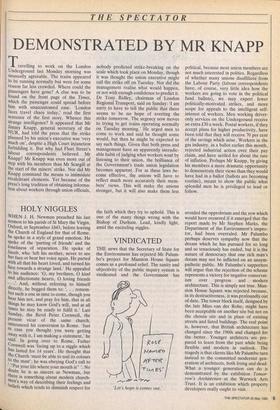HOLY NIGGLES
WHEN J. H. Newman preached his last sermon to his parish of St Mary the Virgin, Oxford, in September 1843, before leaving the Church of England for that of Rome, he spoke in a style of grand emotion. He spoke of the 'parting of friends' and the loneliness of separation. He spoke of Jacob, who 'left his mother, never to see, her face or hear her voice again. He parted with all that his heart loved, and turned his face towards a strange land.' He appealed to his audience: '0, my brethren, 0 kind and affectionate hearts, 0 loving friends
• • .' And, without referring to himself directly, he begged them to: `. . . remem- ber such a one in time to come, though you hear him not, and pray for him, that in all things he may know God's will, and at all times he may be ready to fulfil it.' Last Sunday, the Revd Peter Cornwell, the Present vicar of the same church, announced his conversion to Rome. 'Just in case you thought you were getting away with it, I am making a statement,' he said. In going over to Rome, Father Cornwell was 'facing up to a niggle which has lasted for 14 years'. He thought that the Church 'must be able to nail its colours to the mast'; he was obeying God's call to "Put your life where your mouth is" '. No doubt he is as sincere as Newman, but there is something about modern church- men's way of describing their feelings and beliefs which tends to diminish respect for
the faith which they try to uphold. This is one of the many things wrong with the Bishop of Durham. Lead, kindly light, amid the encircling niggles.


















































 Previous page
Previous page